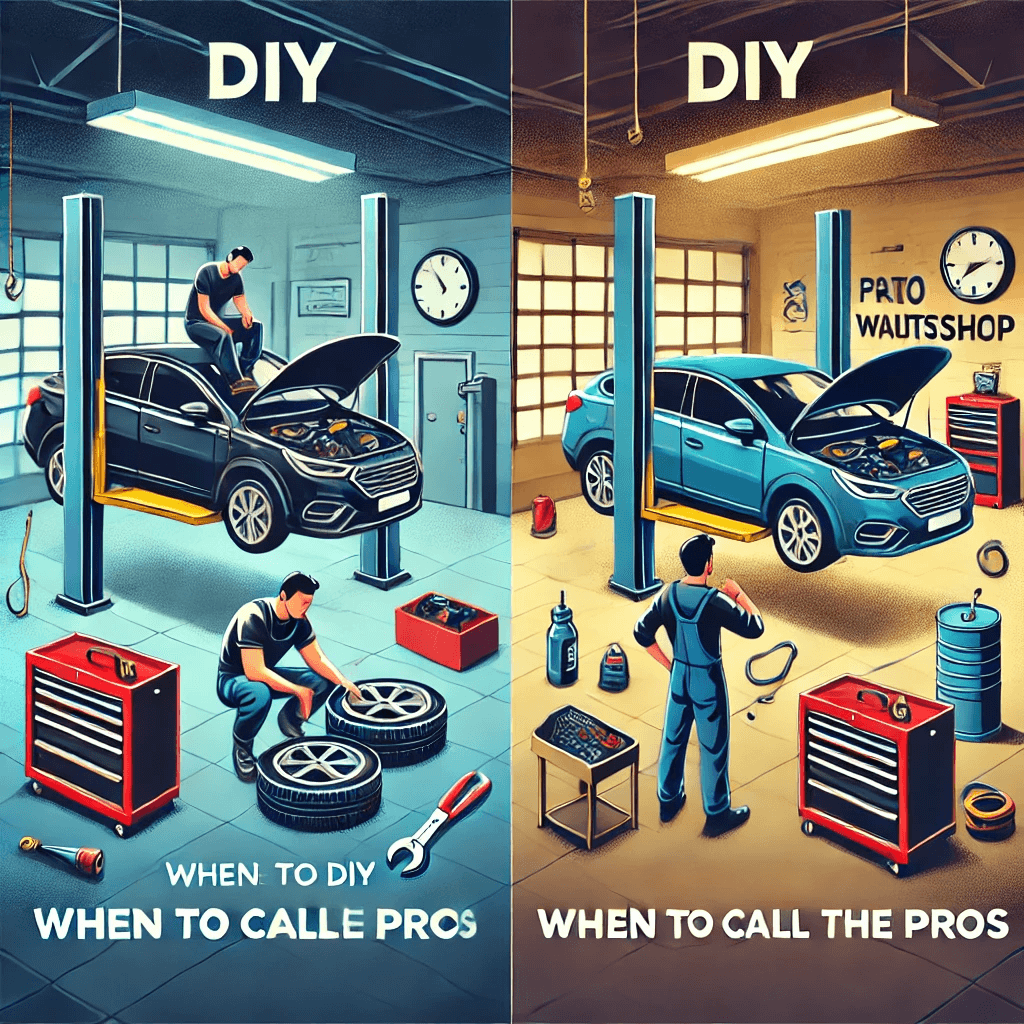Introduction
Deciding between DIY car service and professional maintenance comes down to the task’s difficulty, your expertise, and the tools you have on hand. While handling basic car repairs yourself can save money, certain issues require expert attention to avoid costly mistakes. In this guide, we’ll compare car repair DIY vs. pro, helping you decide when it’s safe to tackle a job on your own and when it’s best to leave it to a professional.
DIY Car Service: What You Can Handle at Home
Performing DIY car service can save you money and time on basic maintenance tasks. Simple services like changing the oil, replacing air filters, checking tire pressure, and topping off fluids can be easily done at home with minimal tools. These tasks not only keep your car running smoothly but also extend its lifespan. However, it’s important to know your limits—while DIY car service is great for routine care, more complex repairs should be left to professionals to avoid costly mistakes.

Benefits of DIY Car Maintenance
A major benefit of DIY car maintenance is the opportunity to significantly reduce costs. Handling simple tasks like oil changes or tire pressure checks at home can significantly cut down on service costs. DIY maintenance is also convenient—allowing you to perform tasks on your own schedule without having to book appointments. Tasks like replacing air filters or checking fluid levels are easy to learn and can be done with minimal tools, making DIY a practical option for basic care.
Limits of DIY Car Maintenance
However, DIY car maintenance has its limits. Many vehicle repairs require specialized tools, knowledge, and expertise that most car owners don’t have. Attempting complex repairs without the right equipment can lead to costly mistakes or even damage your vehicle further. Additionally, some repairs are time-consuming and require a deep understanding of how your vehicle’s systems work. When in doubt, it’s better to consult a professional mechanic to avoid risking your safety and your car’s condition.
Common DIY Car Maintenance Tasks
If you’re comfortable working on your car, there are several tasks you can easily handle at home:
- Oil Changes: Changing your oil and filter is one of the most common DIY tasks and can be done with the right tools and basic knowledge. Make sure to properly dispose of the used oil in accordance with local regulations.
- Tire Maintenance: Routinely monitoring tire pressure and rotating your tires every few thousand miles can extend their lifespan and enhance fuel efficiency.
- Fluid Checks: Topping up fluids like coolant, windshield washer fluid, and brake fluid is simple and can help prevent major issues.
- Battery Maintenance: Cleaning battery terminals and replacing a dead battery are easy tasks that require minimal tools.
- Air Filter Replacements: Replacing the cabin or engine air filter is quick and can enhance air quality and engine performance.
When to Seek Professional Car Services
While DIY tasks are great for basic maintenance, certain car issues are best left to the experts:
- Complex Engine Repairs: If your engine is overheating, misfiring, or losing power, it’s time to call a professional. Modern engines are complicated, and DIY repairs could cause more harm than good.
- Brake System Repairs: Changing brake pads may seem simple, but brake systems are critical to your safety. It’s best to let a professional handle repair, especially when it comes to rotors and fluid lines.
- Transmission Issues: Transmission problems are notoriously tricky. If your car is having trouble shifting gears or making strange noises, only a professional should attempt repairs.
- Electrical Problems: From flickering lights to battery drains, electrical issues require specialized diagnostic tools. A trained mechanic can quickly identify the root cause and fix it safely.
- Suspension and Alignment: Suspension components and wheel alignment are complex systems that impact your vehicle’s handling and safety. These issues should always be addressed by a qualified technician.
Pros of Professional Car Services
There are several benefits to seeking professional car services for more complicated issues. Professional mechanics have access to specialized tools and diagnostic equipment that allow them to accurately identify and repair problems. Professional repairs typically include a warranty, offering reassurance that the work was completed properly and to a high standard. Experienced mechanics can also spot potential problems during routine inspections, helping you avoid costly repairs in the future.
Hybrid Approach: Combining DIY and Professional Services
For many car owners, a hybrid approach works best—handling simple maintenance tasks themselves and relying on professionals for more complex repairs. By taking care of routine services like oil changes, fluid checks, and tire maintenance at home, you can save money while ensuring that your car stays in good shape. When more serious issues arise, it’s smart to consult a mechanic to prevent expensive mistakes. Knowing your limits is key to balancing DIY maintenance with professional expertise.
Cost Comparison: DIY vs. Professional Car Services
When comparing the costs of DIY vs. professional car services, DIY is generally more affordable for routine tasks like oil changes, tire rotations, and fluid top-ups. However, the savings from DIY can quickly disappear if mistakes are made during complex repairs, leading to more expensive fixes later on. Professional services, while more expensive upfront, provide expert-level work that can prevent long-term damage and ensure your car runs safely and efficiently.
Conclusion
The choice between DIY car maintenance and hiring professional services depends on the task’s complexity, your skill level, and the tools at your disposal. While basic tasks like changing the oil or checking fluid levels are manageable for most car owners, more complex issues like engine repairs, brake servicing, and electrical problems should be handled by a professional. By balancing both approaches, you can ensure that your vehicle receives the care it needs, saving both time and money in the long run.














